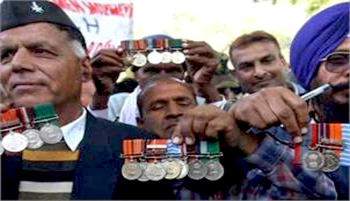
"If I say something, it will become an allegation. Let them prove that it is not political," Parrikar told reporters in Arakkonam in Tamil Nadu when asked if he saw a political link to continuing agitation despite the government's response and notification on One Rank One Pension (OROP) scheme. He said the medals are a recognition of the nation for the sacrifice done by the armed forces.
"Burning and returning them is an insult to the nation and the defence forces," Parrikar said. The minister's comments come in the wake of a section of the ex-service personnel expressing dissatisfaction on the ground that the OROP notification has not fully met their demands. The government had this month formally notified the OROP scheme for over 24 lakh ex-servicemen and six lakh war widows in the country.
"Medals are a recognition of bravery, for the service to the nation. It has nothing to do with service conditions whereas OROP is about service conditions. It does not say you are entitled for medals, it talks about service conditions like your pay and entitlement," Parrikar said. His comments came on a day when Kejriwal visited the protesting ex-servicemen at Jantar Mantar wearing a cap and T-shirt with OROP slogans.
He asked the Centre to implement OROP for the veterans in its "true spirit" rejecting its recent notification in this regard. Kejriwal, who spoke to the media near the makeshift stage of the protesting veterans, however, he did not address the gathering as he was asked not to make any "political statement" by Maj Gen (Retd) Satbir Singh, who is spearheading the movement.
"The government notification is a farce because it is not in its true spirit. Please don't fool the veterans. Implement OROP as per its definition. They are not begging but asking for their rights. It is unfortunate that the country's soldiers are fighting for their rights on the streets," Kejriwal said.
The Chief Minister also tweeted his support for the ex- servicemen saying all their demands are "logical" and that the BJP-led Centre has been "unjust" to them. "Centre shud immediately accept their demands."
The protesting ex-servicemen had earlier met Kejriwal and briefed him about the "shortcomings" in the OROP notification.





Comments
Add new comment